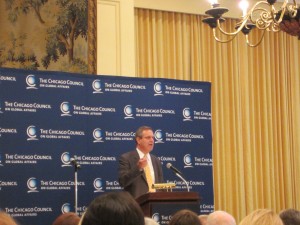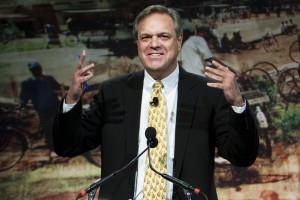Do We Know Who These Smallholder Farmers Are? And Do We Care?
Francis Mamati. Leonida Wanyama. Rasoa Wasike. Zipporah Biketi. Roger Thurow, author of The Last Hunger Season: A Year in an African Farm Community on the Brink of Change, implores us to get to know these farmers–and to support their development–if we are to meet the challenge of doubling food production by 2050 to meet the demands of a growing population.
Roger spoke last Thursday at a Chicago Council on Global Affairs event attended by several Opportunity staff members. Roger serves as the Council’s senior fellow for Global Agriculture and Food Policy, author of the Council’s Global Agricultural Development Initiative’s Global Food for Thought blog, and is a frequent speaker at Opportunity events on our agricultural finance program in Africa.
 This doubling of food production will need to happen on roughly the same amount of land, with less water, growing demand for biofuels, and changing climate patterns—and it will need to come from smallholder farmers. Roger says, “The grand irony is that smallholder farmers have been so neglected over the past decades by international development policies, their own countries, governments in the rich world, and the world’s agricultural industry. They have gone from being too poor, too remote and too insignificant… to indispensable in the fight against hunger.”
This doubling of food production will need to happen on roughly the same amount of land, with less water, growing demand for biofuels, and changing climate patterns—and it will need to come from smallholder farmers. Roger says, “The grand irony is that smallholder farmers have been so neglected over the past decades by international development policies, their own countries, governments in the rich world, and the world’s agricultural industry. They have gone from being too poor, too remote and too insignificant… to indispensable in the fight against hunger.”
Smallholder farmers make up the majority of the population in sub-Saharan Africa and produce the majority of the continent’s food, yet they are the poorest, hungriest people. Without access to financial services, most fail to grow enough food to feed their own families, and experience a hunger season that may last for months before the next harvest. Roger says, “You won’t find the hunger season on any calendar, but it’s a definitive time of the year.”
For farmers in Africa, there is no safety net, no subsidies, no crop insurance. “In the U.S., if the crop fails, the government writes a check. If a crop fails in Africa, people die,” Roger says. In the U.S., 40% of the food we prepare gets thrown away. In Africa, 30-50% goes to waste due to pests, rodents and the climate.
Roger’s new book follows the lives of four hungry farmers in Western Kenya–Francis, Leonida, Rasoa and Zipporah–to determine the impact of loans and training on their crop production and their ability to feed their families. At the beginning, Roger waits alongside the farmers for the annual rainy season to begin, asking himself, “What happens if the rains don’t come? Then there’s no change, and I’m writing a different book.” He nervously asks the question of a wise farmer named Agnes: “What if the rains don’t come?” She calmly replies, “They will come. God knows where we live. God knows who we are.”
 A couple of days later, the rains come. And Roger gets to write a book about Francis, Leonida, Resoa and Zipporah, and the change that comes into their lives as a result of their access to training, and loans to purchase seed and fertilizer. His book is about their dreams to go from farming to live, to farming to make a living; not to just survive, but to thrive. This is also the purpose of Opportunity’s agricultural finance program.
A couple of days later, the rains come. And Roger gets to write a book about Francis, Leonida, Resoa and Zipporah, and the change that comes into their lives as a result of their access to training, and loans to purchase seed and fertilizer. His book is about their dreams to go from farming to live, to farming to make a living; not to just survive, but to thrive. This is also the purpose of Opportunity’s agricultural finance program.
“Credit is the lifeblood of farmers who don’t know when their income will come and how much it will be. It’s not just about inputs, but for other considerations like education,” Roger says.
For the farmers, there are two main goals at the top of their lists, and they are the same that we would have in their position: to feed their family AND educate their children. Not to have to make the decision between feeding their families OR making school fee payments. And all too often, the choice is actually between a NEITHER/NOR, when families have no options available at all. Roger says that that “AND” is elusive in Africa. We can put a little AND in the hands of these farmers.
“So,” Roger asks, “do we know who they are? We do and we must. Because if they succeed, so might we all.”